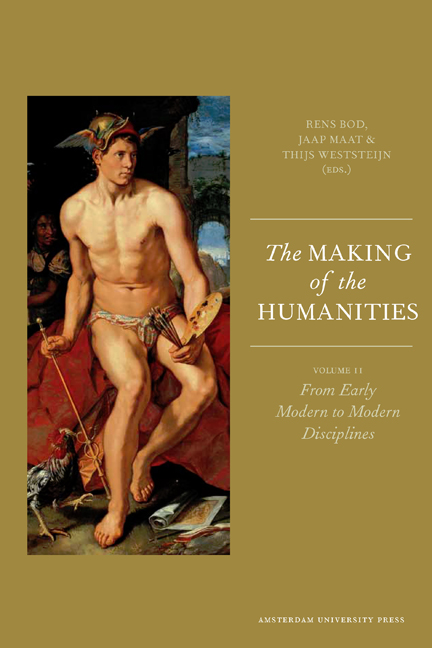Book contents
- Frontmatter
- Contents
- Introduction: The Dawn of the Modern Humanities
- I Linguistics and Philology
- II The Humanities and the Sciences
- III Writing History and Intellectual History
- IV The Impact of the East
- V Artworks and Texts
- VI Literature and Rhetoric
- VII Academic Communities
- Contributors
- List of Figures
- Index
A ‘Human’ Science: Hawkins’s Science of Music
Published online by Cambridge University Press: 19 January 2021
- Frontmatter
- Contents
- Introduction: The Dawn of the Modern Humanities
- I Linguistics and Philology
- II The Humanities and the Sciences
- III Writing History and Intellectual History
- IV The Impact of the East
- V Artworks and Texts
- VI Literature and Rhetoric
- VII Academic Communities
- Contributors
- List of Figures
- Index
Summary
Once upon a time science, learning and knowledge were synonyms. ‘Science’ was by no means a metonymy for what we nowadays call the ‘natural’ or ‘hard’ sciences, and what was formerly called ‘Natural philosophy’. Rather, it stood for a particular kind of knowledge, as it was the translation for the Greek word episteme, which – according to the Aristotelian system – was the enquiry into what cannot be different from what it is, leading ultimately to knowledge of the causes, of the principles of things. These are also the characteristics of that particular knowledge about music, which Sir John Hawkins – author of A General History of the Science and Practice of Music – intends in the second half of the eighteenth century as ‘Science of Music’:
To remove the numberless prejudices respecting music […]; to point out its various excellencies, and to assert its dignity, as a science worthy the exercise of our rational as well as audible faculties, the only eff ectual way seems to be to investigate its principles, as founded in general and invariable laws.
Musicology, the discourse (logos) about music, which is the term that the English, French and Italians use to translate the German word Musikwissenschaft is traditionally said to have been born in the nineteenth century, founded by Guido Adler with an essay published in 1885 and entitled Umfang, Methode und Ziel der Musikwissenschaft (‘Scope, Method and Goal of Musicology’). And this is indeed the right way to view the birth of the discipline, from an academic point of view, as witnessed by the institution, already in 1875, at the University of Berlin of the first-ever professorship of Musikgeschichte und Musikwissenschaft (music history and musicology), held by Philipp Spitta. The use of the term ‘science’, Wissenschaft, in those days clearly denoted a specific way of intending the discipline. As Kevin Karnes points out in a study on music history and criticism in nineteenth-century Vienna, quoting a lecture about the status of art history by Moritz Thausing in 1884, ‘for the art historian as for the musicologist, the question of his discipline's academic legitimacy hinged upon his colleagues’ embrace of the spirit of “the most real of our sciences, the natural sciences”’.
- Type
- Chapter
- Information
- The Making of the HumanitiesVolume II: From Early Modern to Modern Disciplines, pp. 93 - 102Publisher: Amsterdam University PressPrint publication year: 2012



